Russian, Iranian Foreign Ministers Discuss Upcoming Nuclear Talks
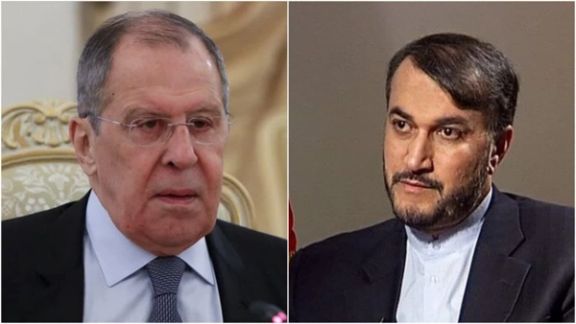
Russia announced that Foreign Minister Sergei Lavrov held a phone conversation with his Iranian counterpart over the resumption of the nuclear talks this month.

Russia announced that Foreign Minister Sergei Lavrov held a phone conversation with his Iranian counterpart over the resumption of the nuclear talks this month.
The phone call on Saturday took place at the request of the Iranian side, the announcement said. Iran’s foreign minister Hossein Amir-Abdollahian who is in quarantine for contracting the coronavirus, discussed the prospects for resuming nuclear talks in Vienna later this month.
The two foreign ministers spoke in favor of restoring the nuclear deal “in its original balanced configuration, approved by the UN Security Council. this is the only correct way to ensure the rights and interests of all participants in the comprehensive agreements," the ministry said.
Iran, which suspended the multilateral Vienna talks in June after the election of its hardliner president Ebrahim Raisi, is trying to gain Russia support before the talks resume. Tehran has been giving signals of a adopting a harder posture.
Lavrov and Amir-Abdollahian also discussed the upcoming visit of Rafael Grossi to Tehran, the director of UN nuclear watchdog, the International Atomic Energy Agency.
The two sides also discussed bilateral and regional issues, including Afghanistan and the situation in South Caucasus.
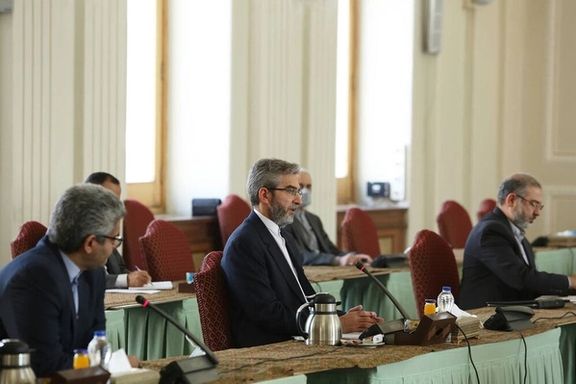
While nuclear talks between Iran and world powers are set to resume this month, there is little optimism among Iranian pundits about a quick, positive outcome.
News website Rouydad24 in Iran says the Raisi administration has failed in nearly all foreign negotiations during its first six months in office. The talks between Iran and Turkmenistan over the two countries' economic cooperation have been discontinued without signing even a single agreement.
The long meeting in Tehran between Afghanistan's neighbors remained fruitless and even annoyed the Taliban who were not invited to the meeting. And there are indications that the presence of individuals close to former chief negotiator Saeed Jalili in Iran's nuclear negotiating team is not likely to have any tangible result in the same way that months of negotiations led by Jalili before 2013 led to nowhere.
After Ali Bagheri-Kani Iran's chief nuclear negotiator said in a November 3 tweet that Iran has " agreed to restart the talks on November 29 in Vienna," Ali Vaez, the director of Iran Project at the Crisis Group, noted in a tweet on November 4 that Bagheri has used the word "starting" rather than "continuing" negotiations, and has called for "removing the sanctions" rather than "reviving the JCPOA."
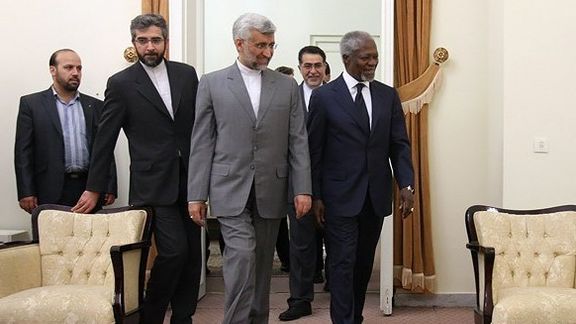
Rouydad24 wrote that looking at the Iranian foreign ministry's approach to the negotiations, it is unlikely that direct talks with the United States would be on its agenda. Also, it is clear that the team will be led by Bagheri, but it is still not known who else will be part of the negotiating team.
Meanwhile, Diako Hosseini, a commentator on Iran's foreign policy said in an interview that "The United States is not prepared to give Iran the guarantee Tehran wants about Washington's behavior toward Iran in the future," adding that "Plan B, that is a military strike on Iran will never happen even if the talks with Iran are not fruitful or even if such talks never start."
US President Joe Biden has spoken about Plan B if efforts to bring Iran to the negotiating table or reaching an agreement fail.
Hosseini said that the Plan B rhetoric is an outdated Trump tactic, adding that maximum pressures on Iran have led to nothing other than deepening the distrust on both sides and leading to the current impasse. He noted that based on Biden's declared policy on Iran taking an action such as attacking Iran will be impractical and catastrophic anyway.
Although some commentators in Iran and abroad have argued that sanctions have been ineffective in forcing Tehran to show flexibility, it was international sanctions that forced Iran to start nuclear negotiations in 2013.
Hosseini ruled out plan B as sheer propaganda and said he does not believe such a plan exists. He also noted that Iran might react to such measures by doing things that would make the situation even more complicated. However, he did not elaborate on Iran's possible actions.
The commentator further opined that such a plan is not likely to change Iran's position but reminded that next year the Republicans might win the majority in the US Congress and subsequently decide to leave the nuclear deal forever. This is one of the reasons Iran is after a guarantee about the continuation of the US commitment to the agreement.
Stressing that the talks to revive the JCPOA will be more difficult than the initial negotiations which led to the JCPOA, Hosseini said Tehran wishes to have the sanctions lifted, particularly the non-nuclear sanctions including restrictions on oil sales and international banking, and that is what has made returning to the talks more difficult.
However, he said negotiating, despite the existing distrust can prevent the deepening of the crisis. "Although it does not mean the talks can provide what Iran wants, yet they can be a beginning to the lifting of non-nuclear sanctions."
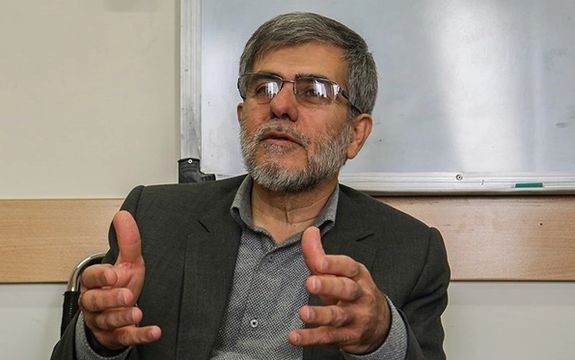
A hardline member of Iran’s parliament has said that the United States must discharge its nuclear deal commitments before it returns to multilateral talks.
Fereydoun Abbasi, a former head of Iran’s Atomic Energy Organization was quoted by Tasnim news agency close to the Revolutionary Guard as saying that the current government’s approach is different from the former president Hassan Rouhani’s administration.
“We should not look at America as the sheriff in town. If they want to negotiate with Iran, they should be just one country alongside other members of JCPOA,” Abbasi maintained. If the US intends to rejoin the 2015 nuclear agreement, it should also pay damages to Iran for having imposed sanctions, Abbasi added.
Iran suspended nuclear negotiations with World Powers in June when President Ebrahim Raisi won the presidential vote. As Tehran has delayed its return to the talks, it has continued enriching uranium and has boosted its stockpile.
This week a new date was set to resume the talks on November 29. Abbasi said that Iran should use both “soft and hard power” in this round of talks. “Soft power is people’s support and hard power is our nuclear and deterrent military progress,” the lawmaker emphasized.

The US State Department spokesman on Thursday said that according to provisions of the 2015 nuclear deal (JCPOA) Iran can never acquire a nuclear weapon.
The statement met with skepticism among reporters who insisted that nothing in the JCPOA explicitly bans Iran from pursuing nuclear weapons after some of its provision expire during this decade.
In an answer to a question if the United States intends to extend some of the expiring limitation on Iran, Spokesman Ned Price responded that the agreement bans Iran from acquiring a nuclear weapon and that is a “permanent” provision.
“What the JCPOA put forward was a permanent, was a verifiable mechanism to ensure that Iran is never able or allowed to acquire a nuclear weapon,” Price added.
Price went on to say that the US is interested first to revive the JCPOA, that former president Donald Trump abandoned in 2018 and make sure that Iran “is once again constrained.” He continued that “we will then use that JCPOA…as a baseline to negotiate what we have – the – not only to lengthen and strengthen the provisions of the deal, but to put on the table and to discuss, in a productive and hopefully useful way, other issues of concern, issues that are of concern not only to the United States, but also of concern to our allies and partners in the region as well.”
In effect, Price reiterated the initial Biden Administration goal of first resurrecting the 2015 deal and then continue negotiating over a better agreement and also the twin issues of Iran’s ballistic missiles and its regional behavior.
Critics of this approach have said that once the JCPOA is revived, the United States has to lift the most effective and damaging sanctions, which would mean throwing the Islamic Republic a financial lifeline. Once Tehran can sell its oil and receive the money, it would have no incentive to make further concessions.
Whether the US has demanded assurances from Tehran during the Vienna talks this year to continue negotiations after sanctions are lifted, is not known. What the spokesman did emphasize on Thursday was restoring control over Iran’s nuclear program first, and then “hope from there we’ll be able to engage in constructive diplomacy vis-à-vis the other challenges that Iran poses to the United States, to our allies, to our partners in the region.”
Asked directly what leverage the United States would have over Iran without the most important sanctions in the future, Price avoided an answer, repeating that Washington is “focused on that first task.”
A reporter asked that a permanent ban on Iran acquiring nuclear weapons “is simply not” in the JCPOA text. Price responded that “What we are relying on are the international instruments that have been negotiated and that, until recent years, had been in place that had permanently and verifiably constrained Iran’s ability to acquire a nuclear weapon.”
The reporter kept insisting that the only permanent provision in JCPOA is Iran’s commitment to comply with the Non-Proliferation Treaty (NPT), which North Korea disregarded and produced nuclear weapons. Price continued to insist that the JCPOA gives the international community “permanent instruments” to monitor Iran’s nuclear activities.
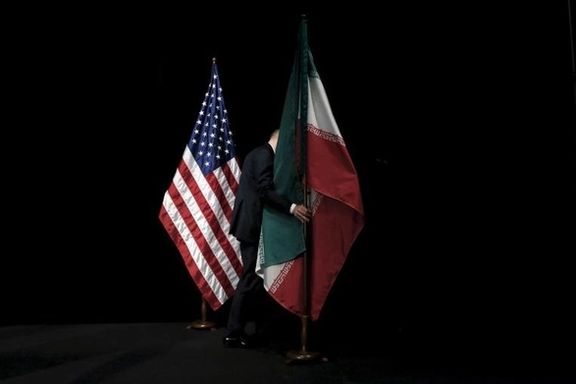
Iran has accumulated 25kg of uranium enriched to 60 percent and 210kg enriched to 20 percent, the spokesman of its nuclear agency told a Tehran rally Thursday.
Behruz Kamalvandi said that only nuclear weapons states are capable of this level of enrichment.
The last report from the International Atomic Energy Agency (IAEA), on September 7, put stocks at 10kg enriched to 60 percent and 84 kg enriched to 20 percent. The sharp increase may strengthen concern in the United States and Europe over advances in Iran’s nuclear program with talks on reviving Iran’s 2015 nuclear deal with world powers set to resume in Vienna November 29.
In Tehran, Iran Diplomacy, a website linked to the foreign ministry, published an interview with Mohsen Jalilvand in which the international relations analyst suggested that both Iran and the US were, in terms of an Iranian proverb, “hitting the table hard” in the belief this would strengthen their position in the negotiations.
Jalilvand mentioned US B1-B bombers flying recently over the Straits of Hormuz as well as Iran’s accusations that it thwarted in late October a US attempt to steal a shipment of Iranian oil, a charge Washington has denied.
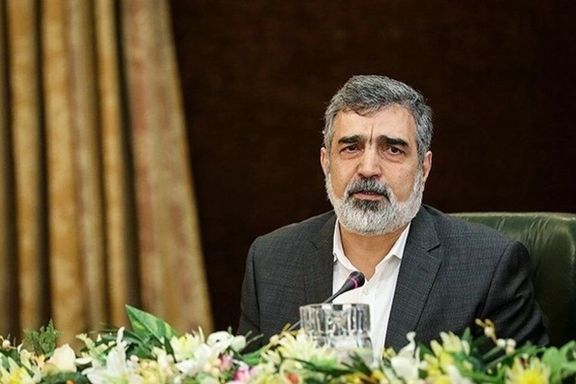
‘Weapons grade’
Iran has since 2019 been breaching nuclear limits set by the 2015 nuclear deal – the JCPOA, Joint Comprehensive Plan of Action – in a response to former US president Donald Trump leaving the agreement in 2018 and imposing ‘maximum pressure’ sanctions on Iran. The JCPOA restricts enrichment to 3.67 percent, well short of the 90 precent considered ‘weapons grade.’
Iran accelerated the program in early 2021 following the assassination of scientist Mohsen Fakhrizadeh and picked up further the pace after attacks on Iranian nuclear sites widely attributed to Israel.
In a report in September the Institute for Science and International Security suggestedIran could have enough material for a crude atomic weapon within a month, although it would need “more time to build a nuclear explosive devise or even longer to build a deliverable nuclear weapon.” The outgoing head of Israeli military intelligence, Major-General Tamir Hayman, said in September that Iran was two years away from the capacity to create a weapon.
But both the US and the European signatories of the JCPOA – France, Germany and the United Kingdom – have expressed concern that the expanded nuclear program is giving Tehran knowledge and experience that undermines the calculations underpinning the JCPOA. Iran, in turn, has said it will respect JCPOA limits once the US lifts ‘maximum pressure’ sanctions levied by Trump and continued by President Joe Biden.
‘Dialogue without delay’
France said Thursday it was holding to the possibility of acting against Iran at the November 18-19 meeting of the 35-nation board of the IAEA, whose head Rafael Mariano Grossi has called for an urgent meeting in Tehran to discuss agency access to the Karaj site, which makes centrifuges, used to enrich uranium,
European signatories of the 2015 deal apparently backed away in September from raising a resolution at the board criticising Iran after Tehran agreed with Grossi to extend a temporary arrangement giving the agency access beyond the minimum required under the Nuclear Non-Proliferation Treaty. Grossi has since argued this included access to Karaj, which Iran is restricting on grounds of a security investigation following a drone attack in June.
“Iran must resume dialogue and cooperation with the agency without delay to make progress on outstanding issues,” France’s foreign ministry spokeswoman Anne-Claire Legendre told reporters in a daily briefing. “Together with our partners, we remain very attentive to ensuring that Iran respects its commitments, and we remain in close consultation on the response to be provided on this.”
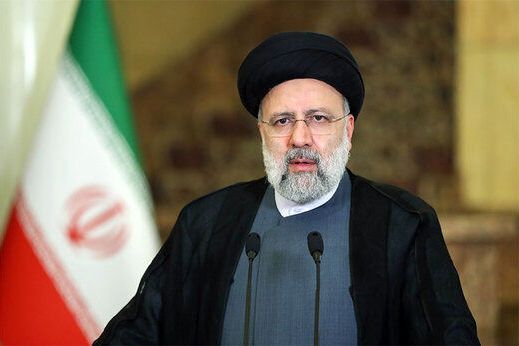
President Ebrahim Raisi referring to upcoming nuclear talks has said “Iran will not leave the negotiating table” but will also not accept excessive demands.
Raisi who was visiting Semnan Province on Thursday said Iran will pursue both the removal of US sanctions and efforts to neutralize them. Iran has always said it tries to circumvent sanctions the United States imposed in 2018 after withdrawing from the 2015 nuclear deal known as JCPOA.
Iran announced on Wednesday that after a four-month absence from the Vienna multilateral talks to revive the JCPOA, it will return to talks at the end of November. Raisi’s remarks were his first statement after the announcement of concrete date to resume the talks.
Iran’s hardline president repeated earlier statements by officials that Tehran wants “result oriented negotiations, and we will insist on the removal of sanctions”.
The Biden administration has said it is willing to lift the most important oil and banking sanctions if Iran also returns to its JCPOA obligations. Tehran has been enriching uranium to up to 60 percent, which has no civilian use.
Iran has delayed its return to the Vienna talks attempting to extract more concessions, but the US State Department said Wednesday that talks should resume exactly form where they were in June.